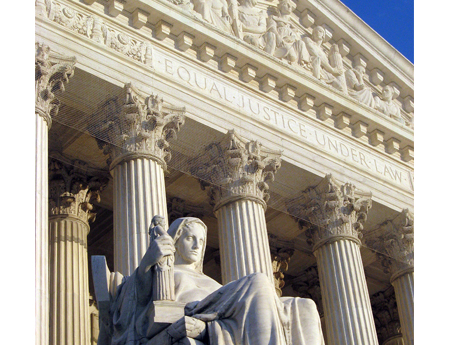Aereo Looking for ‘Justice’

The smarter way to stay on top of broadcasting and cable industry. Sign up below
You are now subscribed
Your newsletter sign-up was successful
Aereo executives either have reached out to the Justice Department, or are expected to, in hopes that it will weigh in with the Supreme Court in support of the company, according to a source familiar with the outreach and attorneys familiar with the process.
An Aereo representative declined to confirm or deny the company had made the move, but founder/CEO Chet Kanojia suggested it would be standard procedure.
An attorney who has argued cases before the high court said that the solicitor general routinely meets with both sides before deciding how and whether to weigh in. The attorney called it “sound legal practice” to try to get the solicitor general to take your side, “and if the SG is going to come down against you, you would want to know it,” he adds.
If the SG plans to weigh in on the side of broadcasters, he will do so by March 3, which is the deadline for the proceeding’s amicus briefs filings. Briefs in support of Aereo are due April 2. (Broadcasters’ initial brief is due Feb. 24, Aereo’s on March 26, according to lawyers for broadcasters.)
One factor that may be in broadcasters’ favor is that the current solicitor general, Don Verrilli, while an attorney with the firm Jenner & Block, represented film and TV studios in the Grokster case, which established that “companies building businesses based on the unauthorized distribution of copyrighted works can be liable for inducing infringement,” according to a Justice Department bio of Verrilli.
Verrilli’s firm also has represented broadcasters in the past; however, the SG is expected to set all that aside in making his decisions.
The Waiting Game
The smarter way to stay on top of broadcasting and cable industry. Sign up below
Aereo and/or broadcasters could have their decision even sooner, both on the SG’s inclinations and the Supreme Court’s.
The Court last week scheduled oral arguments for April 22; a decision is expected by July. Each side will get about a half-hour to make its case, with the SG getting 10 minutes on whichever side it decides to take, if it does so.
Aereo has tied its case to the Second Circuit Court of Appeals’ Cablevision decision, in which it ruled in 2008 that providing a transmission to a single subscriber using a unique copy produced only for that sub is not a performance and therefore does not infringe on the performance right. The appeals court also said that its decision did not “generally permit content delivery networks to avoid all copyright liability by making copies of each item of content and associating one unique copy with each subscriber to the network.”
The Supreme Court will now decide where Aereo falls in that balance.
Information vs. Negotiation
While broadcasters have been pushing the FCC to provide them more information on the spectrum auctions, the commission’s response has produced some angst that the “information” will have more to do with the FCC pressuring stations to give up spectrum.
At its February public meeting, the FCC said it would invest more in outreach to broadcasters, including oneon- one meetings. But that raised some red flags.
“It is not clear what those meetings are supposed to be,” says one veteran broadcast attorney. “That makes you a little concerned that the people who have your ‘station license’ applications in front of them and your indecency complaints in front of them might say, ‘Well, I think you should give up your spectrum or share a channel.’”
The attorney believes one-on-one meetings sound more like negotiation than information. He also suggests that the commission has some strategic sense of which stations they would be reaching out to. If there is a list of which stations the commission wants spectrum from, that should just be made public, the attorney says.
Granted, broadcasters generally know where the FCC wants spectrum, he adds: in major markets such as New York or Chicago. “But there are a lot of places that don’t know whether their market is going to be involved, and they certainly don’t know what kind of dollars are involved.” That, he says, is the key.
“They used the term ‘targeted,’” regarding the outreach meetings, according to another broadcast source, “and that feels like crosshairs.”
The FCC declined comment. But an official on background said that the commission has already held many meetings with individual broadcasters and none had indicated they felt pressured. He added the focus has been on giving stations the information they need, and targeted outreach appears to be the only way to fulfill the FCC’s congressional mandate.
Contributing editor John Eggerton has been an editor and/or writer on media regulation, legislation and policy for over four decades, including covering the FCC, FTC, Congress, the major media trade associations, and the federal courts. In addition to Multichannel News and Broadcasting + Cable, his work has appeared in Radio World, TV Technology, TV Fax, This Week in Consumer Electronics, Variety and the Encyclopedia Britannica.

